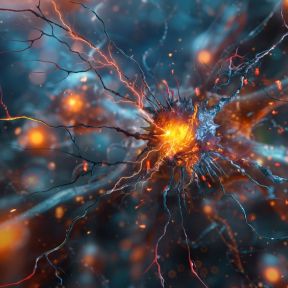
Postpartum Depression
The birth of a baby usually brings excitement, bliss, and joy. But that joy is tempered for the nearly 60 percent of new mothers who also suffer from postpartum depression (PPD). The symptoms include anxiety, depression, irritability, confusion, and crying spells, as well as problems with sleep and appetite. PPD can be mild or severe. When symptoms last just 24 to 72 hours, they can be considered a temporary case of “baby blues,” but when they endure as long as two weeks, new mothers and their partners should take it seriously and seek professional help.

Many women who appeared to function with impressive calm and efficiency prior to the birth of their child may find themselves baffled and disoriented by the onset of postpartum depression. Some research suggests that PPD sufferers were always more susceptible to anxiety than others, and the stressor of their baby’s arrival activated their innate susceptibility. But for new mothers, social isolation and a weak support network have also been shown to increase the likelihood of developing anxiety after childbirth.
Common postpartum symptoms include disorienting feelings of anxiety, irritability, lethargy, or confusion that often lead to frequent crying, sleep and appetite concerns, and in extreme cases, thoughts of self-harm and infanticide. In about half of all cases, symptoms actually begin during pregnancy; in many others, they may not manifest for weeks after delivery, and some experts suggest that doctors should consider postpartum depression as a diagnosis anywhere from six months before birth until a year after.
In extreme cases of postpartum depression, sufferers may experience drastic symptoms including hopelessness, panic, shame, guilt, suicidal thoughts, and even thoughts of infanticide enduring for weeks or months. Severe cases of PPD interfere with a new mother's ability to bond with her baby.
Researchers have identified several possible risk factors for postpartum depression, including marital stress, limited social support, smoking, hormonal imbalance, a personal history of depression or anxiety, and the recent death of a loved one. A conscious awareness of one’s potential risk factors, and an openness to seeking help if and when symptoms arise, can lead a sufferer to seek and access effective treatment while limiting the potential effect on their child’s development and their family relationships.
Yes. As many as a quarter of men will experience postpartum depression during their child’s first year of life. Younger fathers, those with a history of depression, and those experiencing financial stress, appear to be more likely to be diagnosed, and some studies suggest a link between lower levels of testosterone and postpartum depression. But they tend to respond to symptoms differently than women: They are more likely to shut down or isolate themselves and less likely to ask for help or seek therapy. Experts urge couples to seek treatment for postpartum depression together, regardless of which of them is experiencing symptoms.
New mothers may feel the pressure of expectations, even from well-meaning loved ones, not just to be effortlessly perfect in their parenting, but to be joyful in their new role. These expectations may not cause postpartum depression, but they can worsen the experience by making a mother with symptoms feel imperfect, or that she’s a disappointment to everyone around her. They may exhaust themselves attempting to present an appearance of happiness, only adding to their angst. A greater awareness of postpartum depression and its prevalence, and a greater sensitivity to its sufferers, could go a long way toward easing their pain.
Yes. Mothers and fathers who feel uncomfortable, lasting symptoms of anxiety, but not of depression, may be experiencing postpartum anxiety, which is widely undiagnosed, but is both common and treatable. Postpartum anxiety may cause generalized anxiety or panic attacks, as well as some symptoms of PTSD or OCD. Individuals with a personal or family history of anxiety may be more prone to postpartum anxiety, but anyone experiencing these disruptive symptoms should seek help from a mental health practitioner.
Yes. Less research has been conducted on postadoption depression, but the symptoms are similar: New mothers or fathers may be unsure whether that they can be good parents or bond with their new child, spurring guilt, lethargy, difficulty sleeping, and sometimes anger. As with biological parents, adoptive parents should not be alarmed if they experience some of these symptoms for a short period after a child’s arrival in their home, but if they linger for two weeks or longer, they should reach out for professional help.

Given the exhaustion of becoming a parent and the demands of the role, it’s not uncommon for new mothers and fathers sometimes to cry. But new mothers suffering from postpartum depression may cry all day, and feel unable to function. They may want to sleep all the time—or, in some cases, find it impossible to sleep at all. When a new parent experiences these symptoms, or rage, thoughts of self-harm, or a fear or aversion to their baby, they should seek treatment, or, if they cannot muster the energy, a loved one should step up to help them.
Postpartum depression is typically treated with a combination of approaches including talk therapy, antidepressants, hormonal therapy, and support group attendance. A promising new medication recently approved for use by the U.S. Food and Drug Administration, known as brexanalone, can alleviate symptoms in a matter of days with benefits that can last a month, although it must be administered in a hospital setting.
Make sure not to let their self-care lapse. Clinicians advise new moms to maintain healthy sleep, exercise, and eating routines, to take advantage of support from their social networks, and to find ways to make time for themselves. Resisting the urge to criticize themselves for being tired or unsure of themselves is also important.
Spend time with their new child. New fathers are vulnerable to depression, and depressed fathers are less engaged with their children, but research suggests that it’s a lack of engagement with their newborns that may actually spur depression in new dads. Men who spent more time with their infants were less likely to be depressed a year later. Becoming a father triggers changes in men as well as women, including hormonal shifts, greater relationship stress, and pressures that challenge their identity. And while new fathers appear to experience depression at similar rates as new moms, their risk may be greater because they are far less likely to seek treatment for it.
The scary, disorienting condition known as postpartum psychosis is rarer than postpartum depression, occurring in one to two out of every 1,000 deliveries. It also differs in its rapid and severe onset, and more concerning symptoms. Women experiencing postpartum psychosis are severely impaired, suffering from obsessive thoughts, paranoia, delusions, and hallucinations—sometimes with command hallucinations to kill the infant or delusions that the infant is possessed—and are at risk for suicide and/or infanticide. Symptoms of postpartum psychosis usually manifest within the first four weeks after delivery but can occur anytime within the first 90 days.
An insidious symptom of psychosis is that the woman suffering from it may not fully realize that she is in trouble, or that her thoughts could lead to potentially lethal action. She may wonder if her thoughts are abnormal or if the things she sees and hears are real, but those concerns may not stop her from going through the motions of her day—caring for her baby, working, visiting with others. And the longer those thoughts are present without being addressed, the more entrenched they can become.
Doctors, hospital personnel, and even family members often fail to detect postpartum psychosis not just because the condition is rare, but because women experiencing it may not overtly show symptoms. A key difference between PPD and postpartum psychosis is that the disturbing thoughts that are a symptom of both cause great anxiety and distress to mothers with PPD, but may not overtly trouble those experiencing psychosis; a mother expressing concern about her thoughts, therefore, is more likely dealing with PPD and may be easier to diagnose, while a woman with the more dangerous condition may go undiagnosed.














